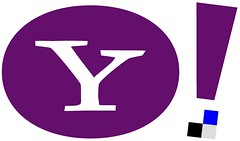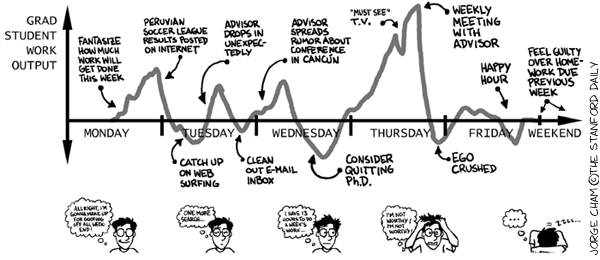
Today, Sun came to talk to U of T CS and ECE students about Sun's latest stuff, evangelizing open source, Java and OpenSolaris, promoting the Sun developer network and student network, as well as giving free T-shirts and CDs. I was at the talk, and got a free T-shirt, it was orange coloured as you can see below.
Front of shirt:

Back of shirt:

I didn't go for the first part of the talk in the afternoon, which was about Sun's
DTrace which is dynamic tracing in the OS. But that wasn't what interested me, what I was interested is Sun's take on Java and seeing what's new with Java, as I haven't kept up with it. So here's what I got from the talk.
Sun has a
developer network just like Microsoft's
MSDN and today Sun stressed about the student connection on the Developer Network. So, I signed up for the network, which offers free
Java and Sun tools like Sun's NetBeans IDE. I missed the first presenter after the DTrace talk, so the presenter that came next was Inyoung Cho, who is a Technology Evangelist. Being a Technology Evangelist is cool, you get to try out and talk about new technologies, I actually wanted to have a job like that when I was working full time and before going back to grad school.
Inyoung Cho, Technology EvangelistInyoung is a graduate from the University of Toronto and now is a Technology Evangelist working for Sun. She first mentioned that from the beginning. She talked about the popularity of Java and how Java is portable (I know that already, so this part was boring for me, I wanted to know about what new things were happening with Java, which she came to later and I will mention that later). She mentioned about the different flavours of Java that run on different types of devices (Micro Edition, Standard Edition, Enterprise Edition). Then she talked about the history of Java with Oak and James Gosling. OK boring again, I've heard this many many times now. What I didn't know was that this year, Java celebrated its 10th birthday, it was in 1995 that Java was born. She showed a picture of the Java team with a birthday cake at
JavaOne, Sun's Java developer conference. Next, she began to talk about the impact of Java, she mentioned Java contributes to a $100 billion economy and it is growing. The stats according to Ovum are the following:
2.8B Java devices worldwide, 1.07B Java powered phones, 700M Java powered PCs, 149 Carrier deployments, 1.25B Java Cards deployed, 4.5M Java developers
Java is everywhere in RFID tags, cell phones, refrigerator magnets, and will be in next generation devices like set-top boxes, toasters, refrigerators (hmm, does this sound familiar, when Sun talked about
Jini doing that? And where is Jini now?). She also talked about how community is what makes Java so successful and where it's at now, and how the Java Community Process (JCP) is there
for creating and extending existing Java APIs. The reasons for Java being so successful according to her are compatibility, community, volume, and value. The next thing she did was to show how easy it is to create a Java application, she had a demo with
NetBeans IDE 5.0 Beta to create a mobile application. NetBeans allows you to create a GUI application form and source code, compile and run in the emulator. You can specify the design by drawing which buttons, and forms goes back or forward. NetBeans also has a profiler which can monitor applications and monitor threads, and you can look at heap size in VM Telemetry Overview. I felt the NetBeans IDE was pretty neat especially the design panel, it seems very similar to developing for mobile devices using Microsoft .NET and
The next thing she talked about was very interesting to me was the Java roadmap for the next couple of years and where Java is going. Is Java dead, like some people say? Well, from today, Java is alive and well. Here is the Java Standard Edition (Java SE) roadmap.
Java 5.0 Tiger

- this is out and has seven New Major Language Features
- Make it more easier to use, eg. they've introduced a Foreach loop
- Powerful new libraries like printf and Scanner
- concurrent utilities (simplified multi-threaded programming
- improvements to Swing (better look and feel)
Java 6
Mustang (will be released 2006/Q3)

- Java 6.0 Mustang Themes:
- Compatibility, stability and quality
- Diagnosability, monitoring and management
- XML and web services * (this will be great since there needs to be tighter integration with XML and web services, it still really isn't that easy to do web services in Java)
- Ease of development
- Enterprise desktop
- Transparency
Java 7 Dolphin (to be released 2008/Q1)
- will include Mustang component JSRs such as annotation processors, JDBC 4.0 (don’t need to specify JDBC driver in Java, just specify in XML), easy to implement web services
- JSR-277 to take care of JAR problems like adding native code to the JAR
- add XML language features, make XML part of Java syntax (that would really simplify stuff a lot!). For example, the idea is that you could write your Java application and XML together like
MyFriend.getFriend(). Right now you can't do that, you have to get a Writer component (like writing HTML in Java using servlets)
Then there were questions and I asked the question about compatibility of Java code from early JDK versions. I know (and I'm sure others also) find it extremely frustrating when I run some Java code and it works in older version of the SDK, but it doesn't run on newer versions because the Java API is deprecated. It makes it so difficult because I have to use a specific JDK to run a Java application which shouldn't be if Java's model is write once run anywhere. Especially for older Java applications that want to run on new Java SDKs. So, Inyoung explained that Mustang will have the feature where you can specify to ignore older JDKs and deprecated APIs .
Sun always likes to talk about future technologies that use Java and so here are some. First one is having Java in the car with iDrive, second is that there will be Java technology in the Blu-ray Disc (for the new standard of DVD). The third is smart dust called SunSpots where you have small sensors and they have a tiny Java VM inside (kind of like Tini or Motes I suppose).
The next talk was from Peter Karlsson, also a Technology Evangelist and he talked about OpenSolaris.
Peter Karlsson, Technology Evangelist, OpenSolaris
First of all, I knew that Sun had a version of Solaris for Intel which I had a copy and tried installing one time but then took it out. I knew that Sun was open sourcing their Solaris OS, but I didn't know that it was called OpenSolaris. So, OpenSolaris is the open source of the Solaris OS. It is free and can be quickly found through Solaris Express. With OpenSolaris, you have everything there compared with Linux where you just have kernel and you have to download packages to build. OpenSolaris has 10M lines of source code. When you go to the
OpenSolaris web site, there is an OpenSolaris source browser which is very fast, you can search for definitions, history, and cross-references.
You can get the
latest marketing numbers for OpenSolaris which I certainly did not know. In my opinion before I came to the Sun talk, I thought Solaris was dead, you just hear Windows, Linux, and MacOSX, but rarely Solaris. Boy, I was dead wrong. OpenSolaris uses a license called CDDL which is based on Mozilla MPL, you can link binary code with source files. Sun's philosophy with OpenSolaris is to release updates frequently to Solaris on a 6-8 month basis. For developer tools, Sun has the Sun Studio compilers, GNU compilers, cool source browser, and bugs can be tracked
here. Also, Peter mentioned that Sun has the best compiler on the planet, which in many cases is faster than the GNU compiler, which I found that interesting. Sun is also trying to create a computer science curriculum for OpenSolaris, and looking into community projects with universities (eg. Sun with UCLA). An important thing to note is that OpenSolaris is not a distribution. Sun is going to build the next version of Solaris using OpenSolaris.
Solaris 10 includes DTrace (dynamic tracing), predictive self-healing, service management framework, secure execution (digital signatures on files before executing), and ZFS (which is Sun's new file system, also never heard about that). Peter made a joke about how he was able to run programs from 1995 on Solaris 10 without having to recompile, he said try doing that with Windows, which to that many laughed. Solaris 10 has process rights management where you can have 48 privileges associated with users, processes. Solaris ZFS is a way cool file system (according to Peter), it has 128-bits, and has very high reliability. Sun has a
Solaris 10 University Challenge which he touted and basically it involves students to work with Solaris 10 and win cash prizes and Sun systems. Solaris is the distribution of OpenSolaris and it’s free. You can participate at
OpenSolaris Del.icio.us tag.
Next talk was about Java GUI with Swing, but I didn't attend the full thing. This is all that I recorded.
Java GUI with SwingShannon Hickey
Technical Lead, JFC/Swing
He was a graduate student from CS at U of T. He gave introduction to Swing and showed Swing demo, then with button and behaviour. I wasn't really much into Swing, so I didn't attend the remaining part of his talk.
All in all, it was ok, hey I got a free T-shirt and free pizza!!!
Here are some links for the Sun Developer Network Academic Program:
Join the Sun Developer NetworkGet your free developer toolsGet trained on Sun technologies and tools at no-costSubscribe to the Student Connection eNewsletterSolaris 10 University ChallengeOpenSolaris communityNetBeansjava.netFind out about all Sun-sponsored open source communities








































